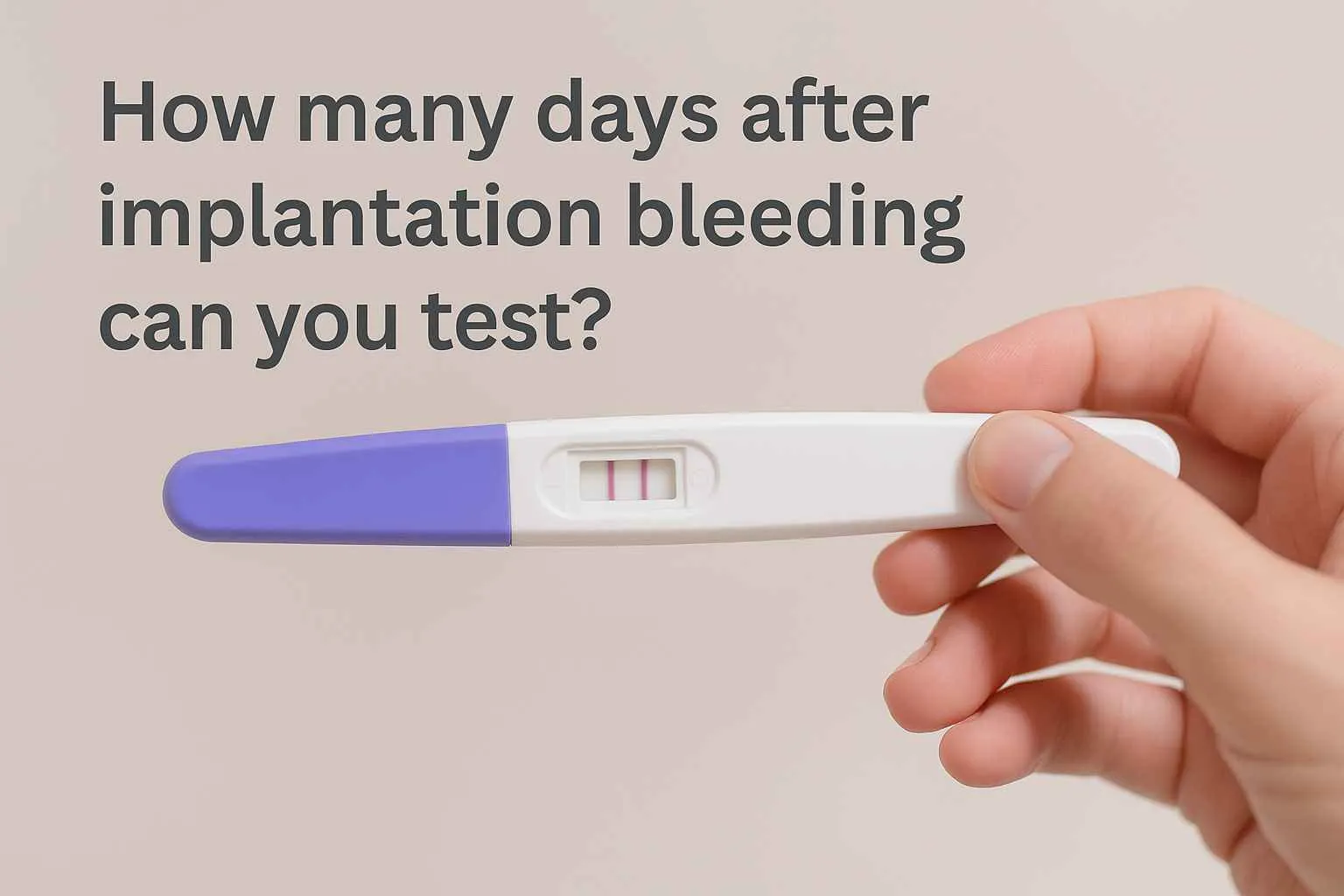Worried about your ovarian health? Not sure where to start? Though detecting ovarian cancer at home can be challenging, learning how to detect it at an early stage can make a huge difference in preventing a life-threatening situation. Understanding the body, finding the subtle changes, and knowing when to see a doctor are steps to catch this silent issue early.
Here’s a simple guide on how to check for ovarian cancer signs at home, the subtle symptoms to watch for, and when to seek medical advice. (Educational purposes only, always consult a doctor for proper diagnosis.)
How to Check for Ovarian Cancer at Home: Symptoms to Notice
Are you wondering how to Detect Ovarian Cancer at Home? Well, you can't diagnose ovarian cancer at home, but you can monitor the persistent symptoms that may indicate the risk.
According to the Centers for Disease Control and Prevention (CDC), the following are the common early signs of ovarian cancer that you should not ignore if they last for more than 2 weeks:
1. Persistent bloating
-
Visible increase in the size of the abdomen
-
Bloating that does not come and go with foods or the menstrual cycle
2. Abdominal or pelvic pain
-
Persistent pressure or discomfort in the pelvic area
-
Pain in the lower abdominal area that does not resolve
3. Feeling full instantly while eating
-
Loss of appetite and inability to eat normal portions
-
Feeling satiated or full after a few bites
4. Frequent or urgent need to pee
-
Needing to pee more often than normal
-
Sudden and strong urges to pee
Secondary Symptoms
Other warning signs that need attention include:
-
Persistent fatigue or exhaustion
-
Unexplained weight loss
-
Changes in bowel habits (like constipation)
-
Lower back pain without an exact cause
-
Persistent nausea or indigestion
-
Unusual vaginal discharge or bleeding (especially after menopause)
-
Pain during sexual intercourse
-
Menstrual cycle changes
How to Self-Monitor for Symptoms of Ovarian Cancer?
Consider the following measures to identify early warning signs:
-
Keep Track of Symptoms: Track the time, severity, and frequency of ovarian cancer symptoms in your diary or using an app, especially if they last for more than 2 weeks.
-
Track Changes in Your Menstrual Cycle: Be aware of irregularities in the menstrual cycle, as they can indicate hormonal imbalances or other problems.
-
Check for Bloating: If bloating persists for a long period and does not resolve with dietary changes, it may need attention.
-
Assess Family History: If ovarian cancer runs in the family, it can increase your risk of developing it.
-
Observe Energy Levels: Evaluate constant fatigue or weakness if it occurs without any obvious cause.
-
Check Your Urination Patterns: Notice how frequently you pee in a day, and also track your bathroom trips at nighttime.
At-Home Testing Kits For Ovarian Cancer
UW Medicine researchers have found in their study that at-home genetic testing kits to detect the risk of ovarian cancers are showing better results than the current typical protocol for genetic tests, which requires more hospital visits and genetic counselling. But these kits identify the risk of developing ovarian cancer rather than detecting its presence. This helps in detecting the amount of risk and taking preventive measures.
These kits are accessible and affordable, and offer the possibility of a better understanding of the risk of cancer. But they are 100% trustworthy, and more research is needed to prove their effectiveness in detecting ovarian cancer.
No doubt, at-home tests are affordable and accessible and offer the possibility of a better understanding of one’s cancer risk. However, these kits may not be 100% reliable, and further study is required to prove their effectiveness.
Professional Screening Options for Ovarian Cancer
In the general population, no routine screening is recommended for ovarian cancer. But if you are at high risk, the healthcare providers can help with some crucial tests.
Screening options for high-risk individuals
These tests are performed every 6-12 months for people at high risk of developing ovarian cancer.
-
Transvaginal Ultrasound: This imaging test provides detailed pictures of the uterus and ovaries to carefully visualize these organs.
-
CA-125 Blood Test: A type of blood test that evaluates the level of CA-125, a protein that can indicate the risk of ovarian cancer. But it's not a definite test alone and can point to other health conditions.
Diagnostic tests (used for people with visible symptoms or after screening)
-
Pelvic Exam: A physical examination to find the lumps or masses in the pelvic area.
-
CT or PET Scan: These imaging tests are performed for detailed images of the pelvis and abdomen to identify or determine the specific stage of cancer.
-
Laparoscopy: A surgical procedure that involves the use of a thin and lighted tube with a camera to view the ovaries and surrounding organs directly.
-
Biopsy: This test is done to confirm ovarian cancer, which involves removing tissue from a growth and examining it in a laboratory.
When to See a Doctor?
Consult the healthcare professional if:
-
you experience 2 or more common symptoms that last for more than 2 weeks
-
your OTC remedies do not relieve symptoms
-
you have a family history of ovarian or breast cancer
Seeing the doctor may help with a pelvic exam, a transvaginal ultrasound, a CA-125 blood test, and a CT scan or biopsy to diagnose ovarian cancer.
Risk Factors for Ovarian Cancer
While ovarian cancer is common among women, overall lifetime risks of developing it are still relatively low. Ovarian cancer often occurs in women after menopause, and cancer chances increase with age. Factors that can increase the risks are-
-
Over 50 years of age
-
Having children after the age of 35 years and carrying a pregnancy to term.
-
Using hormonal therapy to treat menopause
-
Having a family history of ovarian, breast, and rectal cancer
-
Personal history of breast cancer
-
Have never been pregnant
-
Smoking every day
-
Have a history of endometriosis
-
Undergone a fertility treatment with in vitro fertilization
If you are at high risk, discuss genetic testing as well as preventive strategies with a doctor.
Genetic Counseling & Testing For Ovarian Cancer
If you are diagnosed with ovarian cancer, the healthcare providers will advise you of genetic counseling and testing. This will help identify any inherited gene changes, even if there is no family history of ovarian cancer. The most common genetic mutations are in the BRCA1 & BRCA2 genes, but certain ovarian cancers are associated with mutations in other genes, like ATM, BRIP1, MSH2, RAD51C/RAD51D, MSH6, PMS6, or MLH1. Around 25% of ovarian cancer cases are associated with genetic mutations.
The genetic tests for inherited genetic mutations can help in the following ways:
-
In case of gene mutation, you may be more likely to get other types of cancer. Genetic tests can help find them early and lower the risk of developing them.
-
In case of a gene mutation, your family members may also have it. So, genetic tests can help the find their risk of developing ovarian cancer.
-
If you have a BRCA1 or BRCA2 mutation, a genetic test can assist in finding it and getting the right treatment, such as targeted therapy using drugs called PARP inhibitors.
If you are not detected with any gene mutation listed above, the tumor may be tested for some other abnormal genes to determine more treatment options.
Treatment Options for Ovarian Cancer
The treatment options depend on the type, stage, and overall health status of the people. Common treatments include:
1. Surgery:
-
Cytoreductive surgery: Removal of as much visible cancer from the abdomen.
-
Unilateral oophorectomy: Removal of one ovary
-
Bilateral Oophorectomy: Removal of both ovaries
-
Hysterectomy: Removal of the uterus and cervix
2. Chemotherapy:
-
Used to kill remaining cancer cells as a primary treatment if surgery isn't possible or after surgery with the help of chemotherapy drugs.
-
The common chemotherapy drugs are cisplatin and paclitaxel.
3. Targeted Therapy:
-
Involves the use of drugs that target particular molecular abnormalities present in cancerous cells and cause these cells to die.
-
Examples of drugs include PARP inhibitors and monoclonal antibodies.
4. Immunotherapy:
-
Use the person's own immune system to fight off cancer cells in certain situations.
-
As the immune system of the body may be unable to attack cancer cells due to the potential of these cells to release proteins that hide them from the immune cells, the immunotherapy interrupts this process to combat cancer cells.
5. Hormone Therapy:
-
Uses drugs to block the effects of estrogen hormones (which help the cancer cells to grow) on cells related to ovarian cancer.
-
This treatment option is used for specific types of ovarian cancer, like stromal tumors, and also when the cancer recurs after the first treatments.
6. Combination Therapy:
-
Often, multiple treatment options, such as surgery along with chemotherapy and targeted therapy, are used in combination.
-
These treatment options are used for the treatment of advanced stages of ovarian cancer.
Can You Prevent Ovarian Cancer?
You can not prevent ovarian cancer, but you can lower the risk of developing it by:
-
Taking birth control pills for at least 5 years.
-
Maintaining a healthy body weight.
-
Consuming a diet that is rich in vegetables, fruits, and whole grains.
-
Avoiding smoking and limiting alcohol intake.
-
Practicing moderate physical activities regularly for at least 150 minutes per week.
-
Using hormonal therapies under a doctor's guidance.
-
Managing stress by practicing meditation, breathing exercises, yoga, and other relaxation techniques.
-
Getting adequate sleep of 7 to 9 hours every night.
-
Considering surgery, like bilateral salpingectomy and prophylactic oophorectomy in high-risk cases.
Summing Up
So, how to check for ovarian cancer at home? Well, it involves monitoring of persistent symptoms, such as persistent bloating, persistent pressure or discomfort in the pelvic area, feeling full instantly while eating, frequent or urgent need to pee, and many secondary symptoms. This can help with early detection and better outcomes. If you have any doubt, talk to your doctor. Remember that early action can save a life.
Frequently Asked Questions
What are the first few symptoms of ovarian cancer?
Bloating, diarrhea and abdominal pain are the most common symptoms of ovarian cancer. Unfortunately, they are the easiest to overlook as they can also be the signs and symptoms of other medical conditions like indigestion, a stomach virus, and even cramps.
How does one feel when they have ovarian cancer?
One can feel a swelling in the tummy or a feeling of being bloated. One can also feel pain or tenderness in the stomach or the pelvic region. These can cause lesser appetite and an urgent need to pee all the time.
Can a pregnancy test detect ovarian cancer?
No, it's not a reliable method. But, it can give false positive test results, as ovarian tumors can produce hCG, which a pregnancy test can detect, as it is its primary purpose to detect pregnancy.
What are the superficial signs of ovarian cancer?
Bloating, abdominal pain, minor discomfort, pelvic pain, irregular bleeding, and a change in bowel habits.
Does ovarian cancer cause stomach gurgling?
Yes, it can lead to stomach gurgling due to the tumor itself or because of the accumulation of fluid in the abdomen that happens as the cancer cells spread.
Can a pregnancy test detect ovarian cancer?
No, it's not a diagnostic tool for ovarian cancer. But in rare cases, the ovarian tumor can release hormones, like human chorionic gonadotropin, which lead to false positive results.
-User-1754377709.png)
Reviewed by







